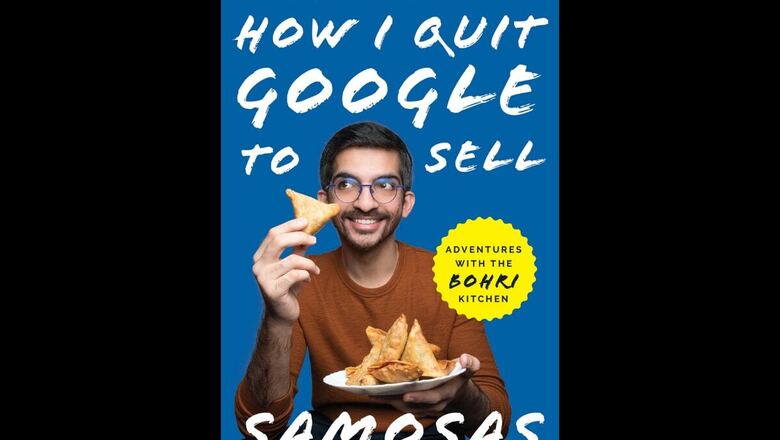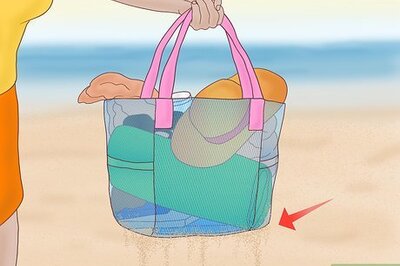
views
The Bohri Kitchen or TBK, as I will henceforth refer to it, was a small food venture founded by my mother and me in November 2014. The word ‘Bohri’ is slang for Bohra, the de rigueur classification for members of our community.
The backstory goes like this. It had been over a year since I had moved back from Hyderabad to join the Google office in Mumbai, and I was the only Kapadia kid in the house. Both my sisters had settled into lucrative careers, married and set up their own homes while my older brother had immigrated to the US. Mom’s responsibilities weren’t as demanding as they used to be, and she now had a lot of time on her hands. She spent it playing Candy Crush and watching saas-bahu TV shows. She was on level #2535644 of Candy Crush when things finally came to a head.
One Sunday afternoon, Mom and I fought over the TV remote. Her saas-bahu show was getting in the way of some sitcom or the other that I wanted to watch.
The back-and-forth on who would control the television set that afternoon had one positive outcome. It became clear to me that my incredibly talented mother needed something more meaningful than these OTT shows to keep her busy. So, I made it my short-term mission to find her a better alternative.
I went for the lowest hanging fruit I could find—her cooking. I thought, if I could find a way to monetize Mom’s amazing culinary talents, not only would it keep her busy and generate a small income for her, but she would thoroughly enjoy herself while doing it!
And thus began TBK, a home dining experience designed around the culinary traditions of our Dawoodi Bohra community. My grand plan to keep Mom occupied was to invite guests—people who I knew personally or through a first-degree connection—to come over to our home in Colaba and eat a meal prepared by her. I would charge them a small per head amount and give them some spiel about Bohra food.
I marketed our very first event by sending out an email featuring our elaborate lunch menu to everyone on my personal contact list. I added a line on safety measures that mentioned I’d need to speak to anyone that wanted to attend before confirming their booking. Within minutes of sending the mail, I received a flurry of responses. I was overjoyed, until I realized that almost everyone had written back asking me to stop spamming them!
The very first enquiry I received was from an extremely nice lady called Sonali. I had no idea who she was or what she did, but I was ecstatic at having received a booking. She called me up to check if we were a restaurant, which I informed her we were not, and if the event was kid-friendly—which it was! She confirmed her booking for seven people, and I was over the moon. After a couple of hours, though, I experienced a sudden rush of nerves. What if this sweet-sounding lady was a thief, or worse yet, a serial killer who now had easy access to my home and entire family?
I quickly called her back and asked her how she’d heard about us. She offered the name of a mutual friend whom I had emailed the invite to. I called this friend, who confirmed that Sonali was a very nice person, with a lovely family, and was most assuredly not a serial killer.
This gave rise to our No-Serial-Killer policy—guests cannot book a seat at TBK, they need to request one. Only after we screen guests by speaking to them, stalking them on Facebook and asking them for personal information about where they live and work, who will be accompanying them, etc., do we confirm the actual seat.
Our first event was slated for the afternoon of 20 November 2014, a Sunday. Dad had no idea what I was up to because I knew I had no chance in hell of getting him to agree to my plan of charging people to eat in our home! I simply told him I’d invited a few friends over to try Mom’s food.
The meal went as planned. I welcomed our guests ever so sneakily, to ensure Dad didn’t catch on. He just assumed he was talking to my friends, so whatever awkwardness hung in the air on account of being in a stranger’s home on a Sunday afternoon dissipated thanks to his expert people management skills!
Highlights of the meal included the Kapadia family favourite Kaju Chicken, served with hot, wholewheat parathas, and Mom’s Smoked Mutton Kheema Samosas (which eventually became TBK’s signature dish). Everyone gathered around the table, excited to see what was in store for them. As people served themselves, I regaled them with chatter about every course, along with a few titbits on the Bohra community. Though reticent at first, by the time the final course of Chicken Dum Biryani came around, the guests were happy and relaxed.
It was a blissful afternoon, especially for Mom and me. The meal was a success, our guests looked pleased and we pulled if off without a hitch!
Before leaving, one of the guests walked up to Mom and hugged her. ‘You have magic in your hands, aunty,’ she said. Taken aback at first, Mom lit up at this warm and genuine praise from a total stranger.
That was a defining moment for TBK. In that instance, I knew that I would first have to convince Dad to allow paying guests to eat lunch in our home.
Two successful events later, Mom and I decided to tell Dad about what we were really up to. Mom took the idea to Dad first. He wasn’t thrilled. He could not imagine making customers out of guests (who normally get treated like royalty in our house). Little by little, we made him see this tiny project from my perspective. It wasn’t about charging people for food, I reasoned, it was about testing whether this idea had merit. TBK would bring attention to our little community and its wonderful cuisine, which we all agreed was worthy of the spotlight.
As he had done with my switch from Wrigley to Google, Dad trusted and supported my decision even if he didn’t completely agree with it. With him on board, the only thing left to do was take TBK to the kind of people up to trying a new cuisine in the home of a complete stranger!
A year later, it was clear that I had succeeded in my goal of drumming up interest for TBK, since my super boss had heard about my side hustle.
Seated across from Vikas in the Google conference room, I shared a few ideas that had crossed my mind to scale-up the business. For the first time, someone I deeply respected, a professional and my boss no less, gave me the assurance that the waves that TBK had made were worth riding. To put it in perspective, he told me that if I gave it a serious shot, one of two things would happen. Either I would fail and within a year probably find myself back at Google (or another multinational). With a five-year perspective, that wouldn’t set my career back by much. On the other hand, if I succeeded, it would put my life on a completely different trajectory, one that neither he nor I could anticipate at the time.
As eager as I was to join the entrepreneurial bandwagon, quitting Google for me was never a serious option. Until now. This conversation gave me much-needed clarity, and for the first time, my business idea had been validated.
I grappled with whether quitting Google was the responsible thing to do. I had put in four years at the company and had a pretty stellar career ahead of me if I stuck with the course. I felt a sense of guilt at leaving a well-paying job to pursue what was—at this stage—only a weekend project with a lot of potential. My education and extra-curricular skills had been carefully seeded so that one day it would bear the fruit of a job at the likes of Wrigley or Google.
The most difficult part of making this decision wasn’t the thought of failure, possible regret or maybe even humiliation. It was telling my parents, especially Dad. This took me back to when I decided to leave Wrigley for Google. I had a PowerPoint prepared to take Dad through the pros and cons, to prove it wasn’t an impulsive, irresponsible decision.
Well, as the title of this book clearly states, I did quit Google. Most people whom I later informed about my decision reacted in one of two ways: ‘Munaf, what a courageous thing to do!’ or ‘That sounds like a foolish decision. Who leaves a thriving career in digital advertising at Google to become a caterer?’
The truth is, neither was it a heroic decision and nor was it an irrational, impulsive one. Quitting Google to take a shot at TBK was a very well-calculated move.
Whoever said that the things that we don’t do haunt us more than the things we do was right.
Read all the Latest News, Breaking News and Coronavirus News here. Follow us on Facebook, Twitter and Telegram.














Comments
0 comment